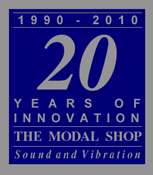|
Recalibrating References
|
When reference standards get recalibrated, the data should be compared to previous data. Ask your calibration provider if they include this service. If not, it's something that you should do upon receipt of the reference standard.
|
|
Technical Exchanges
|
Pat Walter Seminar
March 12-14, 2013
Texas Christian University
Fort Worth, TX
March 18-22, 2013
Anaheim, CA
NAVCON Engineering Network
March 19-22, 2013
NAVCON Engineering Network
April 15-16, 2013
|
|
Quick Links
|
ISO TC 108 - Mechanical vibration, shock and condition monitoring
ISO TC 108/SC 3 - Use and calibration of vibration and shock measuring instruments
SAVE (Formerly SAVIAC)
|
|
Previous Newsletters
|
Accelerometer Calibration Simplified; Why Proper Mounting is Essential
Explaining Uncertainty; Video - Calibration Tutorial
|
|
Select Newsletter Articles
by Topic
| |
|
|
|
Editorial: What's Happening at NIST
with the Sequester?
By Michael Dillon and Michael Lally
|
Many in the US measurement community have asked us "What's happening at NIST?  I'm worried how we are going to remain traceable if they discontinue vibration calibration services..." I'm worried how we are going to remain traceable if they discontinue vibration calibration services..."
First, here are the facts as we know them:
- Management at NIST (United States National Institute of Standard and Technology) sent a letter on November 16, 2012, soliciting input on the intent to withdraw from vibration calibration services with any remaining work completed no later than September 30, 2013. The reason cited was, "... there has been a continuous decline in the requests...and because similar services are available from other accredited laboratories that may meet your organization's needs."
- "Fiscal cliff" and "Sequester" language aside, funding continues to be tightened at all government operations, and current NIST vibration calibration services and resultant revenues are not likely to support the current staffing levels, nor the ongoing equipment investment needed to remain world class.
- Input to the initial feedback period has been taken, but no definitive decision has been made to date.
What does this mean for you?
www.modalshop.com/calibration.asp?ID=808
|
Benefits of ICP® Operation in
Vibration Calibration References
| |
 Exhibiting proven performance in extreme environments, ICP® operation of piezoelectric accelerometers provides excellent reference and stability over time. The ICP mode of operation excels in operator diverse, low signal level, long cable run, and uncontrolled environments. When one considers the myriad of ICP operation benefits for general vibration measurement use, it becomes evident that these benefits minimize uncertainties in the critical competence of vibration calibration. The following article outlines the major features that have propelled ICP vibration references to the heart of most modern vibration calibration systems. Exhibiting proven performance in extreme environments, ICP® operation of piezoelectric accelerometers provides excellent reference and stability over time. The ICP mode of operation excels in operator diverse, low signal level, long cable run, and uncontrolled environments. When one considers the myriad of ICP operation benefits for general vibration measurement use, it becomes evident that these benefits minimize uncertainties in the critical competence of vibration calibration. The following article outlines the major features that have propelled ICP vibration references to the heart of most modern vibration calibration systems.
Click to read full article
www.modalshop.com/calibration.asp?ID=807
|
|
TMS Welcomes New Pressure Calibration Product Manager
|
You may notice a new author named in this issue of  Dynamic Sensor & Calibration Tips. We are pleased to introduce Mike Dillon as Product Manager, Pressure Calibration Products. Mike's name may be familiar, as he brings 10 years of experience with PCB and The Modal Shop as an accelerometer design and electronics engineer, applications engineer and product manager. Dynamic Sensor & Calibration Tips. We are pleased to introduce Mike Dillon as Product Manager, Pressure Calibration Products. Mike's name may be familiar, as he brings 10 years of experience with PCB and The Modal Shop as an accelerometer design and electronics engineer, applications engineer and product manager.
Mike has worked in the US space program, collecting experience in quality management, reliability engineering, avionics testing and program management while with L-3 Communications. Mike is looking forward to developing the TMS Pressure Calibration product line to the same position of metrology excellence as the TMS Accelerometer Calibration product line.
|
| |
Thanks for joining us for another issue of Dynamic Sensor & Calibration Tips. As always, please, speak up and let us know what you like. We appreciate all feedback: positive, critical or otherwise. Take care!
Sincerely,
|
 Michael J. Lally A PCB Group Company
| |